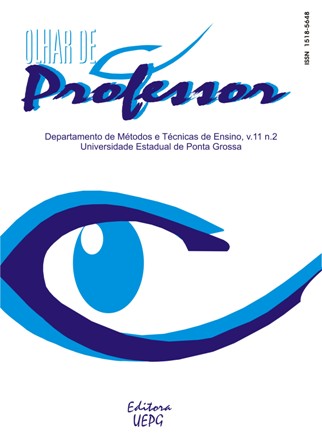DISCUTINDO A PRÁTICA DE SELEÇÃO DE ALUNOS/AS E A ORGANIZAÇÃO DAS TURMAS NA ESCOLA DE EDUCAÇÃO INFANTIL (DISCUSSING THE PRACTICE OF THE STUDENTS SELECTION AND THE GROUPS ORGANIZATION IN THE CHILD EDUCATION SCHOOL) - Doi:10.5212/OlharProfr.v.11i2.275293
Main Article Content
Abstract
O trabalho aborda parte dos resultados obtidos em uma pesquisa de inspiração etnográfica que, a partir dos Estudos Culturais em Educação e das contribuições dos Estudos desenvolvidos por Michel Foucault, procurou discutir e problematizar práticas escolares e o disciplinamento dos corpos no interior de uma Escola Municipal de Educação Infantil. Para tal discussão, foram analisados os aspectos disciplinares a partir da ênfase pedagógica em que o disciplinamento visa, sobretudo, à normalização de certos comportamentos. Reconhecendo que os estabelecimentos de Educação Infantil encontram-se implicados nos processos de objetivação e subjetivação dos indivíduos, problematizou-se a prática escolar de seleção de alunos/as e a organização das turmas na Educação Infantil, já que a mesma incide no disciplinamento dos corpos infantis. Nessa perspectiva, no decorrer das discussões deu-se destaque à produção das crianças e de suas capacidades, através da análise dos efeitos da prática de seleção enquanto mecanismo disciplinar. Nesse sentido, evidenciou-se a lógica disciplinar que movimenta a prática escolar de seleção de alunos/as e a organização das turmas operacionalizada na escola de educação infantil pesquisada. Sendo assim, é possível dizer que se a perspectiva de que as práticas escolares são “produzidas” for assumida, é possível desnaturalizá-las, repensá-las, reinventá-las, experimentando outras posições de sujeito, outros modos de agir e de pensar.
Palavras-chave: Educação Infantil. Práticas escolares. Seleção de crianças.
This work approaches part of the results acquired in research of an ethnographic inspiration, that, from the Cultural Studies in Education and the contributions of the Studies developed by Michel Foucault, tried to discuss and problematize school practices and the discipline of the bodies in a Municipal Child Education School interior. For such discussion, the disciplinary aspects were analyzed since the pedagogical emphasis in which discipline aims, above all, the normalization of certain behaviors. By recognizing that the Child Education facilities are found implicated in the individuals objetivation and subjetivation processes, the school practice of the students selection and the groups organization in the Child Education is problematic, once the same shines on the discipline of the children bodies. In this perspective, throughout the discussions, it is detached the children’s production and their abilities, by the effects analysis of the selection practice as a disciplinary mechanism. In this sense, the discipline logic is shown up which moves the school practice of the students selection and the groups organization managed in the child education school researched. Therefore, it is possible to mention that, if we assume that the school practices perspective are “produced”, it is also possible to denaturalize them, rethink them, reinvent them, experiencing other subject positions, other ways of acting and thinking.
Keywords: Child Education. School practices. Children’s selection.
Downloads
Article Details
Authors who publish in this journal agree with the following terms:
a) Authors keep the copyrights and concede the right of its first publication to the magazine. The work piece must be simultaneously licensed on the Creative Commons Attribution License which allows the paper sharing, and preserves both the author identity and the right of first publication to this magazine.
b) Authors are authorized to assume additional contracts separately, to not-exclusively distribution of the paper version published in this magazine (e.g.: publish in institutional repository or as a book chapter), with the author identity recognition and its first publication in this magazine.
c) Authors are permitted and stimulated to publish and distribute their papers online (e.g.: in institutional repository or on their personal webpage), considering it can generate productive alterations, as well as increase the impact and the quotations of the published paper.
d) This journal provides public access to all its content, as this allows a greater visibility and reach of published articles and reviews. For more information on this approach, visit the Public Knowledge Project, a project that developed this system to improve the academic and public quality of the research, distributing OJS as well as other software to support the publication system of public access to academic sources.
e) The names and e-mail addresses on this site will be used exclusively for the purposes of the journal and are not available for other purposes.

This work is licensed under a Creative Commons Attribution 4.0 International License.





